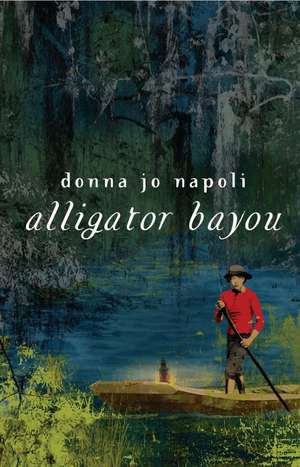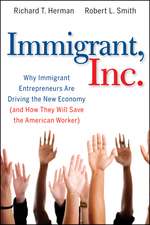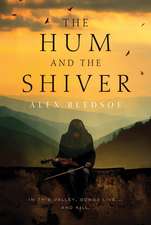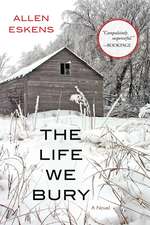Alligator Bayou
Autor Donna Jo Napolien Limba Engleză Paperback – 30 apr 2010 – vârsta de la 12 ani
Vezi toate premiile Carte premiată
Parents Choice Awards (Spring) (2008-Up) (2009), Delaware Diamonds Award (2010)
Fourteen-year-old Calogero, his uncles, and his cousins are six Sicilians living in the small town of Tallulah, Louisiana, miles from any of their countrymen. They grow vegetables and sell them at their stand and in their grocery store.
Some people welcome the immigrants; most do not. Calogero's family is caught in the middle of tensions between the black and white communities. As Calogero struggles to adapt to Tallulah, he is startled and thrilled by the danger of midnight gator hunts in the bayou and by his powerful feelings for Patricia, a sharp-witted, sweet-natured black girl. Meanwhile, every day, and every misunderstanding between the white community and the Sicilians, bring Calogero and his family closer to a terrifying, violent confrontation.
In this affecting and unforgettable novel, Donna Jo Napoli's inspired research and spare, beautiful language take the classic immigrant story to new levels of emotion and searing truth. Alligator Bayou tells a story that all Americans should know.
Preț: 81.06 lei
Nou
Puncte Express: 122
Preț estimativ în valută:
15.51€ • 16.25$ • 12.82£
15.51€ • 16.25$ • 12.82£
Carte disponibilă
Livrare economică 21 martie-04 aprilie
Preluare comenzi: 021 569.72.76
Specificații
ISBN-13: 9780553494174
ISBN-10: 0553494171
Pagini: 288
Dimensiuni: 136 x 205 x 18 mm
Greutate: 0.22 kg
Editura: WENDY LAMB BOOKS
ISBN-10: 0553494171
Pagini: 288
Dimensiuni: 136 x 205 x 18 mm
Greutate: 0.22 kg
Editura: WENDY LAMB BOOKS
Notă biografică
Donna Jo Napoli is the author of many distinguished books for young readers, among them The Great God Pan, Daughter of Venice, Crazy Jack, The Magic Circle, Zel, Sirena, Breath, Bound, Stones in Water, Hush: An Irish Princess' Tale, and, most recently for Wendy Lamb Books, The King of Mulberry Street. She has a BA in mathematics and a PhD in Romance linguistics from Harvard University and has taught widely at major universities in America and abroad. She has five children and one grandson and lives in Swarthmore, Pennsylvania, where she is a professor of linguistics at Swarthmore College.
You can visit her on the Web at www.donnajonapoli.com.
You can visit her on the Web at www.donnajonapoli.com.
Extras
The night is so dark, I can barely see my hands. It's eerie. As if Cirone and I are made of nothing but air.
That's how I used to feel back in Sicily when I'd walk in the caves near Cefalu. I was nothing, till the bats sensed me and came flapping out in a leathery clutter--thwhoosh--then my arms would wake and wave all crazy as they passed by and away into thesea breeze.
But this flat meadow couldn't be more different from those hillside caves; this sleepy Louisiana town couldn't be more different from busy Cefalu; and I feel like a whole new person. I was a scaredy-cat boy when they pushed me onto the ship last autumn to come here. But now I work like a man. And I'm important at work, because I can speak English with the customers.
Still, some of the old me remains. Right now I'm jittery at being out late without permission from my uncles. It was my cousin Cirone's idea. It's always his idea. We all go to bed early every night except Saturday, but he's got energy to spare. He begsme to sneak out.
The grass is high here behind the lettuce field, but soft. It crushes underfoot, silent.
I follow close behind Cirone. He knows lots about this place. He's been in America longer than me. He came with his big brother, Rosario, when he was only four. He's thirteen; I'm fourteen; I edge in front of him now.
The slaughterhouse sits on the outskirts of town, at the edge of the woods. The place is lit up and we can smell the rot and hear the men inside singing as they work. Cirone heads that way.
"Shhh," Cirone says, even though we weren't talking. "They hear Sicilian and they'll chase us off."
I don't get why people here don't like Sicilian. Our family supplies this town, Tallulah, with the best fruits and vegetables. You'd think the sound of Sicilian would make their mouths water. Instead, we hold our tongues--or speak English if we can--in the presence of town people.
But not everyone minds hearing Sicilian.
That's how I met Patricia. I smile. She overheard Cirone and me as we unloaded crates, and she asked what we were speaking. She said Sicilian was pretty, like music. And she walked off singing. We've talked a half-dozen times since then. Always at the vegetable stand. I hear her voice in my head all the time. I'll be working, and there she is, in my mind, looking over my shoulder, saying something sweet.
I miss hearing Sicilian in the streets--jokes, arguments, announcements, everything that makes up life. Here the six of us are like mice on a raft in the middle of the sea. Oh, there are two more Sicilians in Milliken's Bend, five miles away--Beppe and his son, Salvatore. To find more, though, you have to travel down south to New Orleans, over 250 miles. Thousands live there.
I watch Cirone's shadow move farther ahead of me, out of whisper range. But here in the dark it's better to hush anyway.
In the woods now, we wind through pines. These trees are gigantic compared to the trees back home. They crowd out the sky so I can hardly see the stars.
In an instant Cirone is running, and I am, too. We dash for the open grass. No one's chasing us, but it feels like they are.
"Calo, stop!" Cirone grabs me by the arm and pulls me to a halt.
A giant cat comes out of the woods. Tawny brown sleeks his back and white flecks his head and shoulders. He glances at us and pauses as his eyes catch the light: yellow-green. He flicks the tip of his long tail and I think I might wet myself. That cat weighs more than me.
The cat hisses low. Then he walks on toward the stench of the slaughterhouse.
Cirone's fingers dig into my arm. "A panther," he breathes. "They stay in the forests, away from people. It's special to see one so close to town."
"Special?" I'm shaking. In Sicily mountain wildcats don't even come up to your knees. "I can do without special. I can go the whole rest of my life without special."
"We did good. We did really good, Calo. You're never supposed to run from them. You just stare. A panther won't attack unless you look away. If you stare right at them, they think you're going to eat them."
I yank his arm, and we run. We don't slow down till we see our house.
Out front we hear a man arguing with Francesco in English. Shouting. The man stomps off into the night, throwing curses over his shoulder. Cirone and I crouch off to the side. It's so dark, all we can see is the tip of Francesco's cigar, glowing red whenhe sucks on it. And he's sucking fast. Red, red, red, red. He's mad, all right. Cirone and I sneak to the back and climb in through a window. We quick move the sacks of pinecones in our bed that were doubling for us and stash them. We dive under the sheet fully clothed.
My heart still bangs against my rib cage. A panther. This place is full of surprises. Nasty ones.
I have to push Cirone's feet away from my chin. Mine reach past his nose. Feet stink, especially when you don't dip them in the wash pan before sleeping. But lying head to toe is the only way we both still fit in this bed. I turn my head to the right and listen to the noisy breathing of Rosario, Cirone's brother, in the next bed. He's thirty-seven, old enough to be Cirone's father. Rosario has a big beak of a nose and long sideburns. Cirone's nose is small like mine.
Beyond Rosario there's Carlo, in his fifties. And in the next bed, Giuseppe, who's thirty-six. Carlo and Giuseppe are Francesco's brothers. Francesco, the youngest, is only thirty, but he's the leader. It's his nature. He sleeps in the bed closest to the door--the first to face trouble, if any comes.
These two sets of brothers are cousins to each other. And then there's me. We're all from Cefalu, in Sicily. The men call me nephew, and Cirone calls me cousin, even though my father was just good friends with them.
Back in Cefalu I have a younger brother, Rocco. The spitting image of me. The one person alive in the world I know for sure I'm related to. When Mamma died last summer, there we were, Rocco and me, with nobody but each other. Our father disappeared years ago. The Buzzi family next door took in Rocco, but they couldn't afford me; I eat too much. They put me on a ship to Louisiana. They said Francesco would take me in. My father paid his passage to America years before--it was time for Francesco to repay the favor.
I miss Cefalu, with its stone and stucco buildings; I miss the glowing colors of the cathedral mosaics. I miss the sense of how small I become when I kneel in the pews. The music in the public squares. The sharp-and-sweet spongy cassata on holidays, lemony, creamy with ricotta. The purple artichoke flowers in fields that go on forever. The smell of the sea night and day, wherever you go. How close the sky is.
That's how I used to feel back in Sicily when I'd walk in the caves near Cefalu. I was nothing, till the bats sensed me and came flapping out in a leathery clutter--thwhoosh--then my arms would wake and wave all crazy as they passed by and away into thesea breeze.
But this flat meadow couldn't be more different from those hillside caves; this sleepy Louisiana town couldn't be more different from busy Cefalu; and I feel like a whole new person. I was a scaredy-cat boy when they pushed me onto the ship last autumn to come here. But now I work like a man. And I'm important at work, because I can speak English with the customers.
Still, some of the old me remains. Right now I'm jittery at being out late without permission from my uncles. It was my cousin Cirone's idea. It's always his idea. We all go to bed early every night except Saturday, but he's got energy to spare. He begsme to sneak out.
The grass is high here behind the lettuce field, but soft. It crushes underfoot, silent.
I follow close behind Cirone. He knows lots about this place. He's been in America longer than me. He came with his big brother, Rosario, when he was only four. He's thirteen; I'm fourteen; I edge in front of him now.
The slaughterhouse sits on the outskirts of town, at the edge of the woods. The place is lit up and we can smell the rot and hear the men inside singing as they work. Cirone heads that way.
"Shhh," Cirone says, even though we weren't talking. "They hear Sicilian and they'll chase us off."
I don't get why people here don't like Sicilian. Our family supplies this town, Tallulah, with the best fruits and vegetables. You'd think the sound of Sicilian would make their mouths water. Instead, we hold our tongues--or speak English if we can--in the presence of town people.
But not everyone minds hearing Sicilian.
That's how I met Patricia. I smile. She overheard Cirone and me as we unloaded crates, and she asked what we were speaking. She said Sicilian was pretty, like music. And she walked off singing. We've talked a half-dozen times since then. Always at the vegetable stand. I hear her voice in my head all the time. I'll be working, and there she is, in my mind, looking over my shoulder, saying something sweet.
I miss hearing Sicilian in the streets--jokes, arguments, announcements, everything that makes up life. Here the six of us are like mice on a raft in the middle of the sea. Oh, there are two more Sicilians in Milliken's Bend, five miles away--Beppe and his son, Salvatore. To find more, though, you have to travel down south to New Orleans, over 250 miles. Thousands live there.
I watch Cirone's shadow move farther ahead of me, out of whisper range. But here in the dark it's better to hush anyway.
In the woods now, we wind through pines. These trees are gigantic compared to the trees back home. They crowd out the sky so I can hardly see the stars.
In an instant Cirone is running, and I am, too. We dash for the open grass. No one's chasing us, but it feels like they are.
"Calo, stop!" Cirone grabs me by the arm and pulls me to a halt.
A giant cat comes out of the woods. Tawny brown sleeks his back and white flecks his head and shoulders. He glances at us and pauses as his eyes catch the light: yellow-green. He flicks the tip of his long tail and I think I might wet myself. That cat weighs more than me.
The cat hisses low. Then he walks on toward the stench of the slaughterhouse.
Cirone's fingers dig into my arm. "A panther," he breathes. "They stay in the forests, away from people. It's special to see one so close to town."
"Special?" I'm shaking. In Sicily mountain wildcats don't even come up to your knees. "I can do without special. I can go the whole rest of my life without special."
"We did good. We did really good, Calo. You're never supposed to run from them. You just stare. A panther won't attack unless you look away. If you stare right at them, they think you're going to eat them."
I yank his arm, and we run. We don't slow down till we see our house.
Out front we hear a man arguing with Francesco in English. Shouting. The man stomps off into the night, throwing curses over his shoulder. Cirone and I crouch off to the side. It's so dark, all we can see is the tip of Francesco's cigar, glowing red whenhe sucks on it. And he's sucking fast. Red, red, red, red. He's mad, all right. Cirone and I sneak to the back and climb in through a window. We quick move the sacks of pinecones in our bed that were doubling for us and stash them. We dive under the sheet fully clothed.
My heart still bangs against my rib cage. A panther. This place is full of surprises. Nasty ones.
I have to push Cirone's feet away from my chin. Mine reach past his nose. Feet stink, especially when you don't dip them in the wash pan before sleeping. But lying head to toe is the only way we both still fit in this bed. I turn my head to the right and listen to the noisy breathing of Rosario, Cirone's brother, in the next bed. He's thirty-seven, old enough to be Cirone's father. Rosario has a big beak of a nose and long sideburns. Cirone's nose is small like mine.
Beyond Rosario there's Carlo, in his fifties. And in the next bed, Giuseppe, who's thirty-six. Carlo and Giuseppe are Francesco's brothers. Francesco, the youngest, is only thirty, but he's the leader. It's his nature. He sleeps in the bed closest to the door--the first to face trouble, if any comes.
These two sets of brothers are cousins to each other. And then there's me. We're all from Cefalu, in Sicily. The men call me nephew, and Cirone calls me cousin, even though my father was just good friends with them.
Back in Cefalu I have a younger brother, Rocco. The spitting image of me. The one person alive in the world I know for sure I'm related to. When Mamma died last summer, there we were, Rocco and me, with nobody but each other. Our father disappeared years ago. The Buzzi family next door took in Rocco, but they couldn't afford me; I eat too much. They put me on a ship to Louisiana. They said Francesco would take me in. My father paid his passage to America years before--it was time for Francesco to repay the favor.
I miss Cefalu, with its stone and stucco buildings; I miss the glowing colors of the cathedral mosaics. I miss the sense of how small I become when I kneel in the pews. The music in the public squares. The sharp-and-sweet spongy cassata on holidays, lemony, creamy with ricotta. The purple artichoke flowers in fields that go on forever. The smell of the sea night and day, wherever you go. How close the sky is.
Descriere
It's 1899, and to a 14-year-old Sicilian immigrant, Louisiana is a lush world full of hidden rules and tension between the Negro and white communities. He's thrilled by a 'gator hunt in the bayou, and by his powerful feelings for a sweet Negro girl.
Premii
- Parents Choice Awards (Spring) (2008-Up) Gold Medal Winner, 2009
- Delaware Diamonds Award Nominee, 2010

















